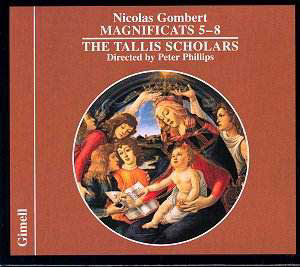This disc is the follow-on to CDGIM 037 (Magnificats
1 – 4) which were released over a year ago, and which were very favourably
received. For this issue, the content is much the same as the previous
disc, and it is wonderful to see that the company can fund the issue
of the second disc – obviously sales on the earlier disc must have been
sufficiently good to justify the recording of the follow-up. Unlike
the previous issue, this disc comes in a slip-case, together with a
list of all Gimell’s releases, and I suspect that many music lovers
will find this of great interest in informing them of the extent of
the current availability of releases, given that they were all deleted
when Universal pulled out of distributing Gimell’s catalogue.
As with the earlier issue, new areas of the Tallis
Scholars’ repertoire are being established, and it is good to relate
that the previous qualities of these recordings – clarity, diction,
pitch, recording quality, and more than all of these, sheer pleasure
involved in the sound of the Choir – remain in full measure.
Nicolas Gombert was part of the Flemish Renaissance
although has been considered as a minor composer (perhaps unjustifiable).
His music has been studied in detail over the past few years and although
his reputation is more substantial than it has been, he probably least
deserves being looked at as a minor composer.
He wrote eight Magnificats, the combined works generally
being considered to be his masterpiece, and according to the previous
sleeve notes of volume one, these remaining four are now released as
promised. As before, each is based upon a chant (Tone) which in worship
both preceded and followed the Magnificat. What we have in this recording
then, is as originally performed with the Tone appearing as described.
Each of the Magnificats is based upon the preceding
Tone and so the listener can appreciate Gombert’s facility in developing
the Magnificat from the chant. Where he is somewhat different from other
composers of the time is in the complexity of his writing. Each work
displays this, and it could be considered to muddy the textures somewhat.
Such is the quality of the singing that this does not appear as a problem.
Gombert often doubles the bass and tenor lines, making for a very rich
texture, quite unusual for this time period. The soprano line is left
as a single strand, and the alto line doubled up only rarely.
In each Magnificat, variety is also introduced by having
the even verses as polyphonic and the odd verses as chants. One slightly
controversial point is the use of what is known as "English Clashes."
These occur when reaching the end of a cadence the notes are inflected
causing momentary dissonances. This technique is deployed in these performances,
so we have an opportunity to hear these "clashes" at first
hand rather than only in print. These are also as a result of Gombert’s
highly developed melodic invention which, when applied to multiple strands
of texture, will almost by definition lead to dissonances and harmonic
clashes.
All the Magnificats use the same basic pattern, and
start with four voices. The complexity of his writing increases throughout
the work until the last verse where we can hear anything up to six voices.
The range of the music is somewhat restricted, so the six strands are
often packed close together. Moreover, he preserved the pitches of the
chants so that the beginning, middle and end of the work was in tune
with the same parts of the chants – quite a complex straitjacket to
work within.
According to the sleeve notes, it appears that the
Magnificats were written as a summation of all of his skills partially
as an atonement and also as a release ticket from serving on a galley.
He had been imprisoned there on the orders of Charles V after having
molested a choirboy in his care. In this age of political correctness,
action groups and so on, it is only to be wondered if these works would
have materialised today given the same circumstances. I doubt it. Well
done Peter Phillips and his choir. A wonderful issue, and well worth
buying.
John Phillips

